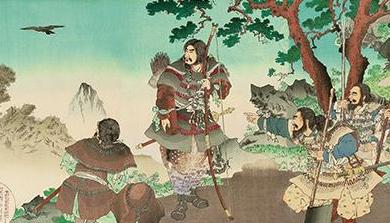As the founder of the Japanese state, Emperor Shenwu has a pivotal position in Japanese history, similar to China's Qin Shi Huang. However, due to the age of Emperor Shenmu, there are many myths in his deeds, which makes people very skeptical about the authenticity when reading Japanese history.
Emperor Shinmu, the fifth grandson of Amaterasu Daijin, set out at the age of 45 on a crusade from Minami-Kyushu to conquer the Yamato Kingdom of Nara at the time. Instead of defeating the Nara monarch Nagahiko, Nagahiko went on a negotiation with Emperor Shinmu, and as a result, Nagahiko was killed by his brother-in-law, Rao Surihiko, who was also a descendant of Amaterasu. Rao ordered the Yamato Kingdom to be dedicated to Emperor Shenwu, and after six years of crusade, Emperor Shenmu ascended the throne and established the Kingdom of Japan.

However, there is great controversy over the deeds of Emperor Shenmu, who ascended the throne in 660 BC and became the tenth Emperor of Worship, during which only eight emperors were produced for more than four hundred years, and only the name had no deeds. But according to the iteration speed of the early Japanese emperors who liked zen positions, the eight emperors in four hundred years were too slow, and they all had to live a long life. However, in the more civilized ancient China, only a dozen of all the emperors lived more than 70 years, so The Shenwu Emperor was at most a person from the qin shi huang era, not a contemporary of the Duke of Qi Huan in the Spring and Autumn period.
When it comes to people who had connections with Japan during the Qin Shi Huang period, it is necessary to mention Xu Fu, as a big fool who shook Qin Shi Huang away, Xu Fu still has something. In the Spring and Autumn Warring States, a hundred families competed, the State of Qi set up a Palace of Learning, as long as there are learned people, every day there are salaries in the mouth, the State of Qi has some visions (such as mirages) in the sea, and many bombastic guys were born, such as the Yin and Yang family Zou Yan and the alchemist Xu Fu.
In his later years, Qin Shi Huang wanted immortality, Xu Fu took the initiative to ask Miao to go to the sea to ask for immortal medicine, the first time he failed to take the medicine, Xu Fu reported that the gift he brought was too thin. So the second time to go to the sea to get medicine, Xu Fu took three thousand boys and girls, three years of grain, clothing, medicine and farming tools, etc., Xu Fu's fleet finally drifted to Japan. However, due to its age and the fact that History was not yet recorded in Japan, There are dozens of Xu Fu landing sites in Japan.
After Xu Fu landed, he asked the Japanese for the elixir of immortality, and the locals said that they could not eat enough, so Xu Fu had no choice but to stay, and it was also a capital offense to return to the Qin capital Xianyang without completing the mission. Xu Fu simply taught advanced technology to the Japanese and settled down in Japan. At this time, Japan was the reign of the tenth emperor, Emperor Shōjin, who also had an honorific title called Emperor Goshoku, which means the first monarch to govern the country. But why are Emperor Shenmu and Emperor Chongshen separated by hundreds of years, so why are they both called founding monarchs?
The boldest conjecture is that Emperor Shenwu and Emperor Chongshen are one person, and that they are Xu Fu! In addition to the three thousand boys, girls, and hundreds of craftsmen and hundreds of guards, Xu Fu's fleet landed in Japan during the Qin Dynasty, and these well-trained Qin warriors had opponents in Japan? Japan's productivity was relatively low before the Warring States Period, and during China's Qin Dynasty, Japan was basically all stone tools and wooden agricultural tools, and hundreds of small countries were lined up. Xu Fu's Qin soldiers were all iron weapons, and Japan had no resistance.
Emperor Shinmu established Japan by force, and Emperor Shōjin established Japanese religion and ideology during his reign, and for Xu Fu, who was born as an alchemist, force and sacrifice were pediatrics. As for whether Emperor Shenmu and Emperor Chongshen were Xu Fu or not, the Japanese would not admit it. The history of Japan, from Emperor Shinmu to the 40th Emperor Tenmu, is compiled by myths, legends and descendants, and its credibility is very low.